#(one of the better examples of it at the exposition)
Explore tagged Tumblr posts
Note
Do you conlang? I was wondering if you had naming languages (or possibly even more developed ones) for pulling the words you use. I tried to search your blog but didn't find anything, wouldn't be surprised if the feature is just busted tho. Your worldbuilding is wonderful and I particularly enjoy the anthropological and linguistic elements.
Ok the thing is I had kind of decided I was not going to do any conlanging because I don't feel like I'm equipped to do a good job of it, like was fully like "I'm just going to do JUST enough that it doesn't fail an immediate sniff test and is more thoughtful than just keysmashing and putting in vowels". And then have kinda been conlanging anyway (though not to a very deep and serious extent. I maybe have like....an above average comprehension of how language construction works via willingness to research, but that's not saying much, also I can never remember the meanings of most linguistic terms like 'frictives' or etc off the top of my head. I'm just kinda raw dogging it with a vague conceptualization of what these things mean)
I do at least have a naming language for Wardi (and more basic rules for other established languages) but the rudimentary forms of it were devised with methods much shakier and less linguistically viable than even the most basic naming language schemes, and I only went back over it LONG after I had already made a bunch of words so there's some inconsistencies with consonant presence and usage. (This can at least be justified because it IS a language that would have a lot of loanwords and would be heavily influenced by other language groups- Burri being by far the most significant, Highland-Finnic and Yuroma-Lowlands also being large contributors)
The 'method' I used was:
-Skip basic construction elements and fully move into devising necessary name words, with at least a Vibe of what consonants are going to be common and how pronunciation works -Identify some roots out of the established words and their meanings. Establish an ongoing glossary of known roots/words. -Construct new words based in root words, or as obvious extensions/variants of established words. -Get really involved in how the literal meanings of some words might not translate properly to english, mostly use this to produce a glossary of in-universe slang. -Realize that I probably should have at least some very basic internal consistency at this point. -Google search tutorials on writing a naming language. -Reverse engineer a naming language out of established words, and ascribe all remaining inconsistencies to being loanwords or just the mysteries of life or whatever.
I do at least have some strongly established pronunciation rules and a sense of broad regional dialect/accents.
-'ai' words are almost always pronounced with a long 'aye' sound.
-There is no 'Z' or 'X' sound, a Wardi speaker pronouncing 'zebra' would go for 'tsee-brah', and would attempt 'xylophone' as 'ssye-lohp-hon'
-'V' sounds are nearly absent and occur only in loanwords, and tend to be pronounced with a 'W' sound. 'Virsum' is a Highland word (pronounced 'veer-soom') denoting ancestry, a Wardi speaker would go 'weer-sum'.
-'Ch' spellings almost always imply a soft 'chuh' sound when appearing after an E, I, or O (pelatoche= pel-ah-toh-chey), but a hard 'kh' sound after an A or U (odomache= oh-doh-mah-khe). When at the start of a word, it's usually a soft 'ch' unless followed by an 'i' sound (chin (dog) is pronounced with a hard K 'khiin', cholem (salt) is pronounced with a soft Ch 'cho-lehm')
-Western Wardin has strong Burri cultural and linguistic influence, and a distinct accent- one of the most pronounced differences is use of the ñ sound in 'nn' words. The western city of Ephennos is pronounced 'ey-fey-nyos' by most residents, the southeastern city of Erubinnos is pronounced 'eh-roo-been-nos' by most residents. Palo's surname 'Apolynnon' is pronounced 'A-puh-lee-nyon' in the Burri and western Wardi dialects (which is the 'proper' pronunciation, given that it's a Kos name), but will generally be spoken as 'Ah-poh-leen-non' in the south and east.
-R's are rolled in Highland-Finnic words. Rolling R's is common in far northern rural Wardi dialects but no others. Most urban Wardi speakers consider rolling R's sort of a hick thing, and often think it sounds stupid or at least uneducated. (Brakul's name should be pronounced with a brief rolled 'r', short 'ah' and long 'uul', but is generally being pronounced by his south-southeastern compatriots with a long unrolled 'Brah' sound).
Anyway not really a sturdy construction that will hold up to the scrutiny of someone well equipped for linguistics but not pure bullshit either.
#I actually did just make a post about this on my sideblog LOL I think in spite of my deciding not to conlang this is going to go full#full conlanging at some point#The main issue is that the narrative/dialogue is being written as an english 'translation' (IE the characters are speaking in their actual#tongues and it's being translated to english with accurate meaning but non-literal treatment)#Which you might say like 'Uh Yeah No Shit' but I think approaching it with that mindset at the forefront does have a different effect than#just fully writing in english. Like there's some mindfulness to what they actually might be saying and what literal meanings should be#retained to form a better understanding of the culture and what should be 'translated' non-literally but with accurate meaning#(And what should be not translated at all)#But yeah there's very little motivation for conlanging besides Pure Fun because VERY few Wardi words beyond animal/people/place names#will make it into the actual text. Like the only things I leave 'untranslated' are very key or untranslatable concepts that will be#better understood through implication than attempts to convey the meaning in english#Like the epithet 'ganmachen' is used to compliment positive traits associated with the ox zodiac sign or affectionately tease#negative ones. This idea can be established pretty naturally without exposition dumps because the zodiac signs are of cultural#importance and will come up frequently. The meaning can get across to the reader pretty well if properly set up.#So like leaving it as 'ganmachen' you can get 'oh this is an affectionate reference to an auspicious zodiac sign' but translating#it as the actual meaning of 'ox-faced' is inevitably going to come across as 'you look like a cow' regardless of any zodiac angle#^(pretty much retyped tags from other post)#Another aspect is there's a few characters that have Wardi as a second language and some of whom don't have a solid grasp on it#And I want to convey this in dialogue (which is being written in english) but I don't want it to just be like. Random '''broken''' english#like I want there to be an internal consistency to what parts of the language they have difficulties with (which then has implications for#how each language's grammar/conjugation/etc works). Like Brakul is fairly fluent in Wardi at the time of the story but still struggles#with some of the conjugation (which is inflectional in Wardi) especially future/preterite tense. So he'll sometimes just use the#verb unconjugated or inappropriately in present tense. Though this doesn't come across as starkly in text because it's#written in english. Like his future tense Wardi is depicted as like 'I am to talk with him later' instead of 'I'll talk with him later'#Which sounds unnatural but not like fully incorrect#But it would sound much more Off in Wardi. Spanish might be a better example like it would be like him approaching it with#'Voy a hablar con él más tarde' or maybe 'Hablo con él más tarde' instead of 'Hablaré con él más tarde'#(I THINK. I'm not a fluent spanish speaker sorry if the latter has anything wrong with it too)
45 notes
·
View notes
Text

That one post of my mine predictably aged like fine wine. Never let somebody on comic twitter in the writer's room😭😭😭 Like imagine a 1 to 1 adaptation of literally any event?? -1b at the box office. "Who are these people???"
#Anywayyy I'm writing a retelling of DC and it is honestly so fun to imagine the characters in a new but familiar light#Like the biggest reason why I was never interested in writing fanfic before 2 months ago is because I never felt like those characters were#I felt... uncomfortable writing it not because i thought fanfic was bad or anything but because I felt it was weird to write for example#“XYZ DID THIS AND DID THAT AND DID THIS” like maybe he did?? I wouldn't know I don't know him like his creator!!!#But comic characters feel like more flexible due to the many interpretations over the years but firm enough where I can decide how to take#Certain traits and minimize them or expand on them#Also 1 to 1 adaptations suck balls to write. I'm not sure if that's universal but the whole fun of writing is coming up with new ideas#Writing a straight adaptation would be kind of writing a translation into a new medium. Which isn't bad. Novelization are literally those#But a common sentiment among writers I've seen is that Novelizations aren't that fun either unless you get to experiment either#Adapting comics into a new format and retelling them is kind of hell because you have all these intersecting plotlines and insane events#That's just tangled up in a story with a timeline that literally makes its contradictions into plot lines. But it's FUN coming up with ways#To condense a character's origin and sort of rewire it into the story you want to tell. Because yeah I think a lot of people miss is#that at end of the day#you tell stories about people and their struggles. You need to find a way to fit those moments of joy sadness love.#Like a movie about Jason Todd being RH will never be emotional as Jason Todd dying because you'll have less time to feel the love and pain#that Bruce felt for him. Like sure#flashbacks and exposition but that can only go so far. At the end of the day#It will always be about RH vs Batman. That's what people came to see. But that's not all Jason is. He was Robin before he was RH. A 1 to 1#Adaptation will never translate that to screen. Plus you (sadly) have shared universes now and a movie can only jump around in time so much#For example in my fic if I wanted to add Tim and faithful to his source material I would need to add so MUCH about Jason death#About like Bruce grieving without skipping all over that and missing the human element. It would severely mess up pacing.#I don't know i love how adaptations can make you see the characters in a new light or elevate the source material#Iwtv my beloved doesn't adapt the books exactly but reimagined in it a way that I like much more#Anyway this proves my point about comic fans being weirdly childish and omfg I hate to use this term...anti intellectual 😮💨😮💨😮💨#Everyone who writes or yknow reads should like understand this on a fundamental level. One to one adaptations are safe but boring.#Like the Psycho remake was bad not because it made bad changes but it barely made any changes.#Anyway watch amc iwtv to understand good adaptations better than your average comic stan on twtter#Not a rant I just love discussing adaptations#Long tags
6 notes
·
View notes
Text
Sometimes a book isn't exactly good, but the vibes are right and that ends up being enough.
#i've decided i'm going to vagueblog about books lmao#which means NO ANSWERS about which book this is#i like to read a lot of the overhyped stuff because i get really curious#most of the time they end up not being great but usually there is something compelling about them and i get why they got the hype#this one for example has some decent characters#but the author keeps trying to do all the worldbuilding through dialogue#which is making the dialogue REALLY CLUNKY#the exposition feels a lot better written outside of the dialogue#but also a lot of this stuff doesn't need to be laid out the way it is#it's like the author decided to give all the answers away and i can't tell if that's them being misleading#or if it's just not great writing#it feels a lot like they took their outlined information and refused to delete any of it during editing#the world is interesting though and there have been a couple moments that evoked very visceral emotion in me#but tbh a lot of stories that try to touch on grief do that to me
9 notes
·
View notes
Text
Writing Character CHANGE
Character development is absolutely CRUCIAL to a story, but having spent more time thinking about this topic, I came to the realization that I misunderstood a lot of points other people have made when teaching how to write character development.
There are a lot of factors that play into character development, but in this post, I'll cover some overall, but the main thing concerns any change to your character! (Which is also a huge part in development, really.)
So with this post, I'll be teaching you MY personal tips regarding this subject!
*The Basics*
Before we really get into the developmental stage, there are some things you want to establish, in which I'll explain later!
A couple of flaws.
How your character views themselves at first.
Your character's morals/ideals and how they think.
These things may vary, but you want your readers to be able to at least roughly predict how your character will act during specific events!
*Change*
Character development is just about how your character changes throughout the story. I like to say that there are several different ways one may change, (we'll get into that later on) but your character should NOT stay the same as the same person during the exposition and during the resolution!
"During character development, your character should grow."
This is a common piece of advice; your character needs to grow. And while I've assumed for the longest time that I understood what it meant, it never truly clicked.
While they will use words such as grow, what they really mean is that your character should mature. By the end of your story, your character may not always end up as a better person. When I say mature, I mean that they have reflected back on their life and have understood the consequences that came with their actions (if any) or how they could've done things differently.
Your character will not always end up as a better, fixed person, but they should understand their world and themselves better.
*Negative/Passive Change*
Alright then, so how does a character develop if they don't necessarily change for the better? Well, I'll get into that!
No matter what, your character should have learned a lesson through their experience. Even if they haven't exactly improved as a person, there should be a moral they can learn from what they have gone through.
If not, then did they really grow?
Additionally, how did their qualities negatively impact themselves? If they are bad traits, then it needs to be clear. And the best way to achieve this is by demonstrating how it hurts your character! However, it is rather uncommon for a character to undergo little to no change after a story!
*Positive Change*
Let's circle back to the basics, real quick. Remember how I said that before any development takes place, your character should be anything but perfect? That same thing applies to after the change.
Do NOT create a flawless character by the end of your story. Instead, focus on one or two flaws that get fixed as the story continues. These don't have to be huge, life-changing imperfections, but they can be minor ones that still shape their life in one way or another.
"Fixing" too many shortcomings can make your character seem, well, out of character, producing a character development that's more forced. The same thing applies if you're attempting to FULLY alter a fault that's just too big. The change will be too noticeable.
What am I talking about? Here's an example!
Imagine a character who's incredibly closed off to other people, wanting to ensure that he never gets too close to others.
That's a pretty sizable flaw, no? By the end of your story, you do not want to completely change because you need to preserve character, but you can change it a bit. Does he have a few friends now? Does he understand that there are some people worth trusting?
He may still be closed off to majority of people, but at least it's not everyone, and that's a realistic change.
*Different Changes*
As I continue to read more stories and watch more shows, I have realized that character development is not always about fixing flaws or personality, but it can extend far past that line.
So listen up, because I feel like no one really talks about this.
Your character can change their IDEALS, MORALS, and how they VIEW THEMSELVES.
Hear that? If your character has strong morals, they will hardly stay the same as they reach the end. Remember the requirements I mentioned at the beginning?
See how it connects now? There is SO much more to character development than changing a few imperfections. Like I said in the start, your character needs to grow and mature. Things like new morals or ideals assist with that!
*SUMMARY*
In order to start character development, you need a couple of flaws, an idea of how your character looks at themselves, and their morals. This is because those are the main parts of you character that may change through time.
Growth = Maturing (gaining a better sense of who they are and the world they live in.)
NOT ALL CHARACTER DEVELOPMENT IS POSITIVE!
For negative or passive change, make sure to clarify how their imperfections affected or hurt them and have some sort of moral that follows.
YOUR CHARACTER SHOULD NOT BE PERFECT!
They should not be perfect in the beginning, and not perfect in the end! Do not 'fix' too many traits because you want to preserve character.
I think that's all! It's quite the post for something so simple, eh? But hey, character development is absolutely PIVOTAL to a story so I hope I at least explained the 'change' part of that well!
Happy writing~
3hks <3
#writing#writeblr#writerscommunity#writing tips#creative writing#writing inspo#writing advice#character writing#writing characters development#character development#character change#writing characters change#character building#tips on character development#tips on character building#advice on character building#advice on character development
2K notes
·
View notes
Text
Want to worldbuild like a pro??
(📖 Master tips and everything I know📖)
Hello writers! You don't know how to worldbuild? Don't know where to start explaining the world you have created? Don't worry, you are in the right place! I have been there myself, and after many research (and even more trial and error) I have put together a list of the best worldbuilding tips I have encountered, and also created some of my own. (I know the first one is kind of overheard, but trust me).
Don't start right away with worldbuilding. A long paragraph about how your world works and its history might overwhelm new readers. A lot of other writers suggest waiting and learning about the world at the same time the protagonist does, or if that doesn't work for your story, dropping bits of information while the story moves forward. However, if you want to give a sense of how your world works from the start...
Exposition through action. This is my favorite method, and it helps a lot if you don't want to pause your story to info dump about the world you have created. Instead, this method relies on explaining the world and its dynamics while you continue with the narrative, briefly. For example: "As always, you couldn't see any trees in the meadow. The king had ordered years ago to cut each one of them because of a prophecy that foretold that the last dragon egg would lay in an oak."
Use expressions that reference normality or routines. In the last point, we used "as always", but there are tons of expressions you could use in your writing. This helps the reader understand what is the norm in this new world and what things are common, to later detect something that is not within that norm (or sometimes just to understand the world and its traditions better).
Use flashbacks when necessary. If you need to explain a very specific or detailed topic, I suggest using a flashback scene, that will help the reader understand with the narration and dialogue, instead of just explaining it to them. It makes for a more dynamic learning experience. But, at the end...
Do whatever will intrigue you. Some readers even like info dumps, and there is not one correct way to show your world. If it would make you curious, go and do it, wether people say it's correct or not. There are a lot of successful books that randomly stop to explain something about the world, and there is nothing wrong with that if you like it.
Hope you find this list useful, and as always happy writing :)
Also, if you are interested in tips or more examples of a specific topic, you can always leave a question in my ask. I'd be glad to answer it!!
Other tips for writers: previous | next
#writeblr#writing#writer#writers#writers on tumblr#writerscommunity#writers of tumblr#creative writing#current wip#world building#worldbuilding#tips for writers#tips#writing tips
2K notes
·
View notes
Text
Writing Notes: Dialogue
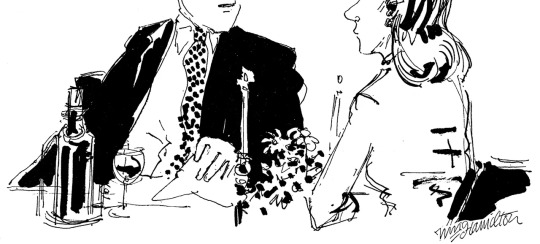
A Guide to Writing Better Dialogue
Consider the following criteria:
The dialogue must move the story forward. After each conversation or exchange, the reader should be one step closer to either the climax or the conclusion.
Reveal relevant information about the character. The right dialogue will give the reader insight into how the character feels, and what motivates them to act.
It must help the reader understand the relationship between the characters.
Tips for Better Dialogue
12 tips to writing forward-focused dialogue:
Keep it brief
Dialogue shouldn’t go over for pages and pages. The best dialogue is brief.
You don’t need to go into lengthy exchanges to reveal an important truth about the characters, their motivations, and how they view the world.
Pair the dialogue down to the minimum that you need for the characters to say to each other.
Avoid small talk
In the real world, small talk fills in the awkward silence, but in the world of your novel, the only dialogue to include is the kind that reveals something necessary about the character and/or plot.
How’s the weather? doesn’t move the plot.
If you’d like to show that your character doesn’t like awkward pauses, work on characterization and scene description.
Instead of using mind-numbingly long exchanges, show the character’s discomfort by describing how she taps her fingers against the window pane, or takes a series of sharp sighs.
Small talk can water down the effectiveness of your scene.
Instead, pick exchanges that capture the essence of the moment, and bypass small talk altogether. Let that be an understood nod between you and the reader, and dive right into the action.
Don’t info dump
While you can certainly use dialogue to learn more about your characters, you shouldn’t use it to dump a whole lot of information on the reader.
If you must info dump, don’t do it in dialogue.
It may slow dialogue to a grinding halt. It may sound awkward.
What’s the difference between info dumping and revealing relevant information?
Info dump is a large amount of exposition given all at once, and left for the reader to sort out.
Relevant information is more subtle, and it’s dispensed a little at a time.
Give your characters a unique way of speaking
Every character, just like every person you know, will have a unique way of speaking and delivering their thoughts.
Some people are more forceful and deliberate.
Others are more passive and meandering.
You can honor these (and other) different styles without rambling.
One method is to focus on word choice.
Example: To show that someone is rather gruff or abrupt, go towards single syllable or somewhat quick words, like “yeah.”
Same basic concept but different delivery, based on character.
Of course, word choice alone can’t dictate character.
You’ll do most of this through characterization, but word choice should subtly support and reinforce characterization.
Also establish a pattern of speech:
Does the character speak in a sharp staccato, or a deliberate, flowy manner?
By knowing how the character (especially the protagonist) speaks, you can create consistency whenever the character dialogues with others.
Be consistent
Remember to be consistent with your characters.
Someone who speaks in a self-depreciating and shy demeanor won’t automatically become bold and acerbic.
When your characters speak, they should stay true to who they are.
Even without character tags, the reader should be able to figure out who’s talking.
Create suspense
Use dialogue to increase the suspense between characters.
It’s human nature for people to withhold what they’re truly thinking or feeling.
People leave a lot unsaid, and this is also true for the characters in your novel.
To create a realistic interaction between your characters, you must honor the fact that most people leave a lot of things unsaid.
But that doesn’t mean that the reader can’t be privy to what’s being left unsaid.
As a writer, you can build the scene, show the characters’ motivations and desires before the scene, and let it play out, with the reader wanting a resolution that doesn’t quite happen.
Answer the following questions to setup your scene for suspense:
Does one character have the upper hand in the scene?
Is the other character seething just under the surface?
What does the reader find out through the exchange?
You can control all of this through dialogue.
Honor the relationship
Characters tend to speak differently based on who they’re speaking to.
A character will speak to his mother differently than he does to his best friend. That’s not a shift in consistency.
It actually gives more depth and realness to the character. You can still stay true to the personality you’ve created by using the same speech pattern.
Show, don’t tell
“Show, don’t tell” is the writer’s mantra.
When writing dialogue, it’s easy to start “telling” what the characters are feeling instead of showing it.
Instead of your character saying, “I’m angry!” describe how the character’s body is closed--tight lips, narrow eyes, deep breaths.
Don’t underestimate your reader.
The reader likes to see the scene, pick up the cues and come to the conclusion, instead of being told what to think. Your dialogue shouldn’t be completely on the nose, and explain exactly what the character is feeling.
Most people -- including your characters -- aren’t always aware of how they feel.
And sometimes, what they say they feel is different from what they truly feel.
Use dialogue to reveal characters, but not directly.
Body language is also an important part of dialogue, and should be written into every scene. It gives the reader important clues that they’ll use to recreate the scene in their mind.
Minimize identifying tags
“He said, she said” gets boring after a while.
And the answer isn’t to switch out those “said” tags with other words like “enthused” or “shouted”. (When it doubt, “said” wins out.)
Not only is it boring for the reader to constantly see “he said” or “said she”, it may be disruptive.
Identifiers take the reader out of the immersive world of your story and reminds them that you, the author, are relaying a story.
That can be pretty jarring, and it can happen if you use identifiers too often.
Of course, you can’t not use identifiers.
They’re vital for establishing who’s speaking, but can be minimized by doing the following:
Creating a unique pattern of speech.
Using descriptive follow ups. (e.g., “That’s not what I said.” Vincent reached for the rock.)
The second option can show what the characters are doing to further emphasize their words, or add context to the scene.
Greetings and goodbyes aren’t always necessary
While it’s only polite to say hello and bid adieu, it’s not necessary in novel dialogue to document these courtesies.
You can use exposition for salutations, but do avoid writing a blow-by-blow.
Set up the scene by describing how the character enters or leaves the scene.
Avoid speeches and soliloquies
Most people, in conversation form, do not have the privilege of extended speech.
They’re almost always interrupted because who wants to listen to someone natter on and on?
Read it aloud
During the editing process, you should always read your manuscript aloud, but do pay special attention to your dialogue.
If the dialogue doesn’t seem to flow, or you’re tripping over your words, it’s not going to sound right to the reader.
Even though you’re not capturing every part of a conversation in your dialogue, everything that’s written should sound like an actual person said it. If not, it’s time to erase and try again.
Source Writing References: Worldbuilding ⚜ Plot ⚜ Character More: Formatting Dialogue ⚜ Children's Dialogue ⚜ Dialogue Prompts
#writing notes#dialogue#writeblr#spilled ink#dark academia#creative writing#on writing#writing tips#writing advice#writing ideas#writing inspiration#light academia#literature#writers on tumblr#poets on tumblr#writing reference#writing prompt#writing resources
213 notes
·
View notes
Text
Overall NATLA Thoughts
Okay, now that I've watched the series, I can give my thoughts.
Overall, I thought it was good!!! I had fun watching it! I'd rate it a solid 6.5/10. It's nowhere as good as the original, but it was definitely enjoyable and made some nice changes here and there that I liked. There were also some things I was also Not a fan of too.
I said in another post that it's best to treat this like an AU of the original. There will things that are great and things that are bad. That's the nature of adapting something.
Having said that, I need to get my initial thoughts off my chest... here we go.
Things I thought were good:
Sokka's characterisation - I really enjoyed him! I thought Ian did a good job! He played the funny moments well and retained the underlying seriousness/cautiousness. It wasn't perfect, but I enjoyed the changes a lot and think it was overall a solid performance.
Zuko's characterisation - Like Sokka, I do think I was most satisfied with their performances. A lot of Zuko's moments from the cartoon are sometimes... well, cartoonish and definitely wouldn't translate to live action, but I think Dallas did a nice job at balancing Zuko's desperate anger and that occasional sassiness well.
Zuko and Iroh moments were great. Had me on the floor crying. As it should have.
The bending looks a trillion times better than the movie - I understand it would not have been easy for the actors but, overall, I was very happy about it.
The scenery was stunning. It just looked so beautiful. I loved it so much.
Absolutely ADORE that they made Zuko a good calligrapher and artist. I read a fic about a million years ago where Zuko is a fantastic calligrapher and I thought it was perfect and made so much sense, and now I can say it's canon. This is perfect for me.
S U K I
The Freedom Fighters were ✨ perfect
They were so real for making Oma and Shu lesbians
Koh, Wan Shi Tong and Hei Bai looked fantastic, but I have more to say about all of them below, unfortunately.
I actually like the change they made that Katara is Aang's sole waterbending teacher.
Aang is not perfect, and needed more goofy scenes HOWEVER, I did like how they've had Aang's guilt more prominent in the story. The original didn't do a very good job with that, imo.
Zuko entering is breaking and entering era by breaking into an impenetrable Earth Kingdom prison is just perfect.
In Masks, I like how Aang and Zuko got a longer conversation - that was pretty cute.
I liked how they changed Yue a bit and got her out of the arranged marriage... how Yue saw Sokka in the Spirit World before meeting him in the real world.
Things I didn't like:
Far too much info-dumping/exposition. So much spelling things out. It was not as egregious as the movie, and I get there's a lot of information that needs to be conveyed well and quickly... but sometimes it really took me out of the show.
Why are Mai and Ty Lee here.... I was hoping the live action would give them a bit more depth (and they might as it goes forward!), but why put them in season 1 at all if they're just going to stand around???
Some odd changes - putting this as one point, but there are some bizarre changes that didn't make sense to me, as they did not benefit the story or deepen the characters. I have two main examples: a) making it so Aang didn't run away from home, and b) making it so Zuko actually fights Ozai in the Agni Kai.
Characterisation of Katara was Not Great. I don't think I got many hints of the reckless, compassionate, badass Katara until the end when she fights Pakku and rallies all the women together to fight (which happens off-screen). She was sweet and kind, but she just lacked the fire that OG Katara has.
Azula's characterisation - Azula is desperate to impress Ozai and so her character is just…. brewing with anger, frustration, desperation. I was SO excited to see the Azula we are introduced too… perpetually and irritatingly calm, calculating and ruthless. She's perfect, she's terrifying! She's literally the character of all time. But this Azula had more Zuko vibes? I don't think there's anything wrong with giving Azula more concrete motivation by wanting to impress Ozai and establishing that Ozai is abusive to both his kids, but I do think trying to do that right off the bat is a mistake.
WHY is Wan Shi Tong here. I love Wan Shi Tong, but like I said: Why Is He Here? Why could we not have his iconic, ominous as fuck introduction from The Library, and instead he's introduced in a random season 1 episode giving Aang Information(tm) about the Spirit World.
When Aang gave Koh the statue, and then he just takes it and immediately lets all the villages go, and neither of them even say anything, I actually laughed out loud. Like, I am so sorry, but what in the jesus fuck was that.
Speaking of Koh - I think Koh is better the less we know about him. Roku saying ~all Koh wants is a family like the rest of us~ just pissed me off?? I like my Koh the Face Stealer Terrifying and Unknowable, thank you.
NOTHING EVER REALLY HAPPENS WITH HEI BAI!!?? where's my precious spirit bear?? Like Aang never really does anything with him and the replacement Koh story is boring and it sucks.
Bumi.... sorry I just didn't vibe with him at all.
Things I can't decide on:
Fancy spirit knife to kill the moon spirit annoyed me a bit, but I guess they wanted to Kuruk something to work with and a little bit more interaction with Aang which I get but idk. I really flip/flop on this one.
I've been very on the fence about having Azula (and Ozai) being in the show in season 1 in general. I'm not sure if it benefited either of their characters.
Azula & Ozai's dynamic - Okay, so, I think they're trying to give Azula more depth, right? They're trying to establish what it was like for Azula to live with Ozai and that she's also (like Zuko) trying to desperately prove herself to him, but Ozai using Zuko's... achievements to do that just felt so weird. I get he's doing it to manipulate her, but that just felt so wrong when in canon it's very obvious that Ozai just didn't give a single fuck about Zuko. Ozai pits Azula against Zuko by saying he's a failure, he's a bad bender etc. Azula is born lucky, Zuko is lucky to be born - like, Ozai says that to Zuko's face. I don't know if I am communicating this point very well, but it just didn't seem right to me??
Zuko vs Zhao in the Siege of the North... I genuinely do not know how to feel about it! I didn't love it, I didn't hate it. I don't know how to feel about Zhao telling Zuko that his mission is a sham and that Azula is the prized one... It feels like it's saying the quiet part out loud? In the OG we all know that Ozai sending Zuko on that mission was an excuse to get rid of him, but we can work that out, no one actually says it. And then Iroh just fucking killing him/mortally wounding him instead of the Iconic scene where Zuko reaches out to save him despite everything Zhao has done to him, but Zhao's own pride gets in the way from letting him accept help from Zuko.
Zuko’s crew being the 41st is not necessarily a bad thing at all!!! But I do just want to say that in the original, the attack goes ahead, and presumably, those soldiers die. It’s horrible. Zuko’s sacrifice is in vain, and it was always going to be in vain because the Fire Nation as it stands would not allow Zuko's compassion to win. Ozai would not allow it. While not necessarily a bad choice (all the soldiers bowing to Zuko on the boat was so sweet I loved it!) but I think it does take away some of the horror of Zuko’s story (same as it does with making Zuko fight back in my opinion) because the whole point is that Zuko did the right thing - and he was punished for it, and those soldiers died anyway.
anyway...
Okay!! got that off my chest. I know I just had a big whine here, but I still had a lot of fun watching this show. I think some of the backlash is a bit over the top and unwarranted. It was never going to stand up to the original - and that's okay.
Enjoy it for what it is!
#zuko#sokka#katara#aang#yue#iroh#zhao#azula#ozai#jet#koh the face stealer#wan shi tong#hei bai#natla#avatar the last airbender#atla netflix#avatar netflix#hattie talks#live action series#hattie's natla ramblings
786 notes
·
View notes
Text
ATLA Live Action Series Review:
The Good
Aesthetically this show felt right. Sure sometimes the outfits didn't quite feel lived in, but I always felt like I was watching a fantasy world with decent effects and interesting design. Also, I really enjoyed the sets!
Bending: Yes some of the fights feel very quick, but the bending looks cool. It is certainly better than 10 benders lifting one big rock. I can honestly say the opening bending fight scene gave me so much hope for this show.
Kyoshi Warriors: I loved seeing them in live action, and I thought Suki's performance was great!
Omashu: I think the mashup of the mechanist made sense since that is an important character overall and I would hate to see him cut. However, both Jet & the secret tunnels felt sloppily thrown in.
Northern Water Tribe: I really loved the way it looked, and appreciated the two episodes we spent here. I think Yue gained more agency in this interpretation, and why shouldn't the moon spirit be a waterbender. Also, episode seven felt the most in tune with the original show's spirit.
Zuko: I think he was one of the most fleshed-out and best parts of the show! Dallas Liu really captured Zuko's spirit, and the scene between him and Aang in episode 6 was wonderful!
Soundtrack: Hearing the original soundtrack bits is always great, and when I first heard the ending music I was so excited.
Is the show perfect, no - but I wouldn't mind a season 2.
The Bad
Pacing: Turning 20 episodes into 8 was bound to lead to some cuts...but oftentimes times things felt too quick or disjointed. I think there were editing problems contributing to this for sure, but sometimes things skipped around too much without a clear purpose as to why. Also, why bring in plots from later seasons when you barely have enough time already?
Writing: This show definitely suffered from exposition dumping, though it did get better as time went on. I think the biggest example of this is actually opening in the past rather than the present. We do not get to learn along with Aang that the world has changed, instead, we get to learn that 100 years have passed....which doesn't hold the same tension or worldbuilding.
Clunky Dialogue: Along with exposition, clunky dialogue is another example of bad writing. I think sometimes I felt like the acting was kind of meh in the beginning, but then over time I began to realize it had far more to do with the lines characters were trying to deliver. The actors themselves are not bad, just cursed with awkward writing and lines that feel out of touch with the setting they're in.
Main Trio: I don't entirely know that I believe Katara, Sokka, and Aang are friends as opposed to 3 people stuck together to save the world. Aang feels a little too somber for a young kid running away from his responsibilities, Sokka is protective, but not exactly the heart of the team, and Katara is sort of just there until the last two episodes. Where is her struggle, her desire to learn so strong she steals from pirates? Also, while Gordon Cormier did a great job, Aang does zero waterbending on his own, is overly serious, and tells Katara not to fight. Where is his desperation to protect his friends? It feels like they all lost emotional depth.
Tension: Bringing Ozai, Azula, and Zhao out in the beginning immediately causes us to lose the realization there is an even bigger bad. Part of why Ozai is so terrifying is he is a primarily silent villain until the third season when we finally see the face of the "big bad evil guy" behind it all. Yes, they add to Zuko's backstory, but again, they are revealing the villains too early. Azula is the antagonist of season 2 and one of my favorite characters, so I hope they do more with her in the future. Finally, Zhao is supposed to be an example of the uncontrollable nature of fire unrestrained, instead, he comes off as vaguely threatening with the supposed true power being Azula.
Characterization: While all characters are bound to lose something in a shorter show, it still felt like certain characters were more mutilated than others. I am sure there are 100 different opinions on who, but I think the biggest victim was Katara.
Katara: Katara manages to go from a complete novice to a bending master in what feels like a matter of days. The journey feels short, and that makes the results feel largely unearned. Katara is one of the strongest personalities in the show, determined, kind, and fiery. In many ways, she is the unpredictability of water - equally dangerous as it is necessary to live. She is the child of a war who lost her mother, forced to grow up too soon, and even raised her older brother. Yes, Katara often gets stereotyped as the mom friend, but overall she feels underutilized in this show. We really don't see enough of her journey until the very end.
Iroh: Iroh was always comedic but most importantly wise. Even when Zuko is trying to give himself advice, he mimics Iroh. Instead, he seems to be used more as comedic relief without the underlying experience. He just doesn't feel right. Also, he kills Zhao instead of Zhao getting himself killed - which is less about Iroh and more about the writing than anything.
Ozai is weirdly a little too nice. Yes, he burned Zuko and pits his kids against each other, but he feels toned down in a show claiming to be more mature than the original cartoon.
Azula is perhaps more realistically worried about losing her status as the golden child, but she is also missing the cruelty she and her father share. I understand worrying about making your character cartoonishly evil, but the Fire Nation is currently a deeply nationalistic empire trying to control the world. Where is the deep-seated belief that they are better than other people, not just trying to bring balance to the world? There is a line between creating complexity and toning down the very real evil inherent in this plan.
Roku: I can only say what the fuck was that. He was barely there, and not the serious master to Aang's youthful exuberance.
The Ugly
Show, Don't Tell: The show's single biggest issue seems to be speeding through story parts by simply stating things. Instead of allowing the audience to discover, trusting that we are smart enough to understand, let's just blatantly say things like Zuko is the only reason the 41st division is alive to their faces. Even though in the context of the story Ozai literally already said that.... it's the division, the division for Zuko, Zuko's division.
Thematic Misunderstandings: I think this show makes several minor changes with major implications, such as airbenders actively fighting the firebenders, when airbenders are known for their pacifist nature and the lie of an Airbender fighting force is actively propaganda. Similarly, Aang very quickly accepts his role as the avatar and doesn't even run away in the beginning. Without this conflict between his desire to be a carefree child and the fact that the world needs him - the show loses a key aspect of Aang's character. Also, the obsession with downplaying the avatar state as something dangerous feels like a disservice to the tradition, connection, and strength of the avatar, which can be permanently destroyed as the trade-off for that kind of power. It's dangerous for the balance of the entire world, not just because it's powerful!
The Agni Kai: Zuko's fight against his father is one of the defining moments of Ozai's cruelty, not just because he is willing to fight his child, but because Zuko tried to do everything right. Zuko shows deference to his father, apologizes, and most importantly refuses to fight! The determination not to upset his father and still be grievously injured and banished is a hugely important theme for the fire nation and Zuko's life as a whole. He tries to do everything he is supposed to and only regains his father's acceptance after he "kills" Aang. Zuko's struggle between moral vs. social right and wrong in contrast to his family is hugely important to his character.
-----
TLDR: ATLA was a fantastical animated television show that was never afraid to show character development and flaws. When you turn 20 episodes into 8, you are bound to lose something. You hollowed out the middle, leaving the shell of important moments and events without ever wondering if all the times in between formed the true spirit of the show.
Rating: 6.5/10 It's perfectly fine and worth a watch. Not a disaster, but certainly falls flat of the original.
#atla#avatar the last airbender#avatar the last airbender tv#atla tv#spoilers#natla#i loved it i hated it i mostly sat through it#i would like a season 2 though#aang#katara#sokka#zuko#iroh#uncle iroh#azula#ozai
858 notes
·
View notes
Text
Eight Strategies for Improving Dialogue in Your Writing
Well, hi! Oh my… wow! It’s been a long time since I’ve posted! I’ve been very busy and I am genuinely sorry to all my followers, but that doesn’t mean I’ve forgotten about this account, but here is one final post for the year!
Hopefully next year I become consistent with it again!
Let’s begin!
One of the best ways to help a reader connect with your writing is by crafting excellent dialogue. Use these tips to learn how to write dialogue that showcases character development, defines your characters’ voices, and hooks readers.
Why Use Dialogue?
Good dialogue performs all sorts of functions in fiction writing. It defines your characters’ voices, establishes their speech patterns, exposes the inner emotions, and showcases their character development. Beyond mere characterization, effective dialogue can also establish the setting and time period of your story and reveal information in a way that doesn’t feel overly expository.
Authors use lines of dialogue to reveal a character’s personality and express their point of view. For instance, an archetypal football coach might speak in short, terse sentences peppered with exclamation points and quotations from famous war generals. By contrast, a nebbish lover with a broken heart might drone on endlessly to his therapist or best friend, speaking in run-on sentences that circle around his true motivations. When an author can reveal character traits through dialogue, it cuts down on exposition and makes a story flow briskly.
Eight Writing Tips for Improving Dialogue
The first time you write dialogue, you may find it quite difficult to replicate the patterns of normal speech. This can be compounded by the concurrent challenges of finding your own voice and telling a great story overall. Even bestselling authors can get stuck on how a particular character says a particular line of dialogue. With practice and hard work, however, lackluster dialogue can be elevated to great dialogue.
Here are some strategies for improving the dialogue in your own work:
Mimic the voices of people in your own life. Perhaps you’ve created a physician character with the same vocal inflections as your mother. Perhaps your hero soldier talks just like your old volleyball coach. If you want to ensure that your dialogue sounds the way real people speak, there’s no better resource than the real life people in your everyday world.
Mix dialogue with narration. Long runs of dialogue can dislodge a reader from the action of a scene. As your characters talk, interpolate some descriptions of their physical postures or other activity taking place in the room. This mimics the real-world experience of listening to someone speaking while simultaneously taking in visual and olfactory stimuli.
Give your main character a secret. Sometimes a line of dialogue is most notable for what it withholds. Even if your audience doesn’t realize it, you can build dynamic three-dimensionality by having your character withhold a key bit of information from their speech. For instance, you may draft a scene in which a museum curator speaks to an artist about how she wants her work displayed—but what the curator isn’t saying out loud is that she’s in love with the artist. You can use that secret to embed layers of tension into the character’s spoken phrases.
Use a layperson character to clarify technical language. When you need dialogue to convey technical information in approachable terms, split the conversation between two people. Have one character be an expert and one character be uninformed. The expert character can speak at a technical level, and the uninformed one can stop them, asking questions for clarification. Your readers will appreciate it.
Use authentic shorthand. Does your character call a gun a “piece” or a “Glock”? Whatever it is, be authentic and consistent in how your characters speak. If they all sound the same, your dialogue needs another pass.
Look to great examples of dialogue for inspiration. If you're looking for a dialogue example in the realm of novels or short stories, consider reading the great books written by Mark Twain, Judy Blume, or Toni Morrison. Within the world of screenwriting, Aaron Sorkin is renowned for his use of dialogue.
Ensure that you’re punctuating your dialogue properly. Remember that question marks and exclamation points go inside quotation marks. Enclose dialogue in double quotation marks and use single quotation marks when a character quotes another character within their dialogue. Knowing how to punctuate dialogue properly can ensure that your reader stays immersed in the story.
Use dialogue tags that are evocative. Repeating the word “said” over and over can make for dull writing and miss out on opportunities for added expressiveness. Consider replacing the word “said” with a more descriptive verb.
925 notes
·
View notes
Note
how do i make my writing more ‘mature’? i always feel like no matter how sophisticated i write and no matter every which way i change it up it always has a sense of being childish or juvenile.
Making Writing Sound More Mature
1 - Better Plot and Story Structure - One of the telltale signs of juvenile writing is a story that meanders, has no obvious plot or structure, has no conflict or has a protagonist with no goal. So, make sure you have a well fleshed out plot, with a conflict, protagonist goal, and which hits the beats specific to your story's genre.
2 - Three-Dimensional Characters - If you're writing plot-driven fiction, make sure your main characters have a fleshed out personality, stakes, motivation, goal, and compelling relationships with other characters. If you're writing fully or partially character-driven fiction, do all of the above, but also make sure your main characters have a relevant internal conflict and a thoughtful character arc.
3 - Well-Developed Setting and World - One common hallmark of juvenile writing is a lack of "sense of place" and under-developed world building. So, make sure you put a lot of thought into where your story takes place... not just the immediate setting of each scene, but the overall world of the story, or at least the parts of it that are relevant.
4 - Incorporate Literary Devices - Juvenile writing tends to be lacking in the use of metaphor, simile, symbolism, irony, themes, and motifs. So, make sure to include those, but also take the time to make them relevant to your story.
5 - Include a Broad Range of Vocabulary - One common element of juvenile writing is a reliance on limited, simple vocabulary. Don't be afraid to use a thesaurus to find more interesting word choices--just be absolutely certain to crosscheck your choices with a dictionary to make sure they are the right choice. Online thesauruses in particular are bad about offering up bad suggestions. Also, make sure to learn and use special vocabulary that is relevant to your story, genre, or setting. For example, if your character is a retired police detective trying to solve a murder on his stalled cruise to Alaska, you need to make sure you know the proper investigative terminology, because he will definitely use it. And, by that same token, you'd want to make sure you know cruise ship lingo as well. And, part of this, too, is getting better at description and the inclusion of emotional and sensory detail.
6 - Use Varied Sentence Structure - This is a big one... juvenile writing tends to use repetitive sentence structure, such as simple sentences (she stood up, she went to the window, she waved at the man), lack of subordinate clauses (Tad Smith, who was a seasoned and retired investigator, had looked forward to this cruise his whole life...), repetitive starts (every sentence begins with a pronoun, for example), uniform length (all short sentences, for example.) So, make sure your sentences are varied. If you read them out loud, you don't want it to sound rhythmic, but more like a complex melody.
7 - Show, Don't Tell... Most of the Time - Telling definitely has its place, but most of the time you want to show rather than tell, meaning that instead of stating things simply and directly (the sun was shining) you want to paint a clear but indirect image (dappled sunlight shone through the trees.)
8 - Avoid Cliche Phrases - Human language is littered with everyday phrases like "to each their own" or "better late than never." Generally-speaking, you want to avoid these phrases in your story, especially in exposition. If you include them anywhere, they're best spoken as dialogue by a character who it makes sense would say something like that. Likewise, be careful of cliche genre or character-type phrases. For example, villains who say things like "we're not so different, you and I..." or "I finally have you right where I want you!" These overused phrases tend to make stories sound juvenile and unpolished.
9 - Avoid Cliche Tropes - Another type of cliche to avoid if you want more mature-sounding writing is cliches of various tropes. Tropes on their own are a good thing, but when tropes are used the same way over and over again in a genre or type of story, they become predictable. For example, the super gorgeous protagonist who everyone is in love with, but they view themselves as plain and not special. Or the broken/hopeless/addict mentor character. It's not that you can't use any cliche tropes at all, just make sure your story isn't riddled with them, and do what you can to put your own spin on the ones you do use.
10 - Read, Read, Read - And I can't stress this enough... the absolute best way to improve your writing style and take your writing from juvenile to polished is to make sure you're reading a lot of fiction, in a lot of genres, by a lot of authors. Audio books, short stories, and poetry count, too. The more you read, the more you begin to: understand plot and story structure, recognize well-developed characters, easily envision complex settings and worlds, learn vocabulary and literary devices, become attuned to varied sentence structure, and learn to recognize cliche phrases and tropes.
Happy writing!
•••••••••••••••••••••••••••••••••
I’ve been writing seriously for over 30 years and love to share what I’ve learned. Have a writing question? My inbox is always open!
♦ Questions that violate my ask policies will be deleted! ♦ Please see my master list of top posts before asking ♦ Learn more about WQA here
261 notes
·
View notes
Text
Writing Advice: Too Many Characters
A common advice when writing stories is "don't write too many characters". But, like with everything creative and good, there is no definitive answer to how many characters should be in a book!
So I will be discussing numerous variables in storytelling which impacts how many characters you should have and what makes something in a book "pointless".
Themes! Themes! Themes! (Omori Spoilers, Not Too Much)
The most important question that a writer has to ask themself is "what is this scene/book/media trying to do?". If your story is based on the relationships we have with others and the impact they can have on our psyche then having a close-knitted community of people will drive the message of intimate connection better then just having more people in there. If your story is focused primarily on introspection, looking inward, individuality, and other spiritual activities then the protagonist is more likely to spend longer durations of the media by themselves.
An example of these to forces is the popular game of Omori.
(SPOILERS ABOUT OMORI<3)
Omori is a game that focuses on acceptance first and foremost. Self-acceptance to be more specific. Due to the fact that the game is a piece of introspection both for Sunny and for the player, the most important moments in the game such as the "reveal" sequence of pictures and Black Space are ones that are done on your own.
However, the game also prioritizes the relationships Sunny has between his friends as this serves as motivation for the final duet. The final duet was an act of bonding as Mari and Sunny just wanted to spend time together, doing something they liked.
The introspection moments are pushed towards the end of the game because it's only when Sunny has that support and belief in his friends, can he rise above his doubt and shame and fear.
2. What Is The Purpose Of This Character?
All characters need to have a purpose in the narrative. Both within the context of the world and in the context of the book.
Within the context of the world, they need a goal that is going to impact the protagonist either positively or negatively.
Within the context of the book, what is this character giving to the audience that wouldn't otherwise be there?
Pro tip: All the characters you have need to have more then one purpose! Characters that give exposition can't JUST give exposition.
If you have a love interest that can be cut out without taking away a vital part of the story either from a thematic(theme) standpoint or a narrative(plot) standpoint, just replace them with an object and move it along!
If you have an ally character that only shows up twice and can be changed into "I went down to the store to buy these items", give that "ally" tag to someone more story relevant"!
3. Priorites?
Ask yourself this: "Do I have the book length to dedicate time to this person?"
If the answer is no, follow my next steps. If the answer is yes, here is how to make them better.
When I say "prioritize", I mean you need to figure out what type of character this character is. Are they a main character? A side character? Cannon fodder? A symbol? WHAT ARE THEY?
Also, can you give these character responsibilities to someone else? This simultaneously gives those characters deeper complexity and eliminates more characters
Example: Love Interest, after being trapped by the villain, uses their intelligence in order to provide information about the villain to the hero. (Love Interest + Ally + Informant)
Example: Friend is revealed to be a double agent on the side of the Villain. However, it's revealed that Friend was secretly a triple agent who is finally redeemed from their original believed betrayal. They're back to being an ally. (Friend + Betrayer + Ally + Enemy)
236 notes
·
View notes
Text
Lore Rekindled; The Lore Olympus that should have been
To be honest, I checked out the rekindled version before the original one and now having reading the original as well, it's extremely odd. Y'know goodbye volcanic high where the original was a mess but a group of 4chaners made a parody game which turned out to be of better quality than the original? This is like that but replace 4chan with tumblr users, mainly @genericpuff whose series is pinned in their tumblr blog where you can check all of the episodes, especially updated ones. In this post, I will be praising this series of how it fixes the problems of the original
The Pacing
One thing I notice about lore olympus and lore rekindled is the pacing. Not just the flow of the story but where it chooses to focus on. Now in lore olympus, the pacing is kinda a mess and its mainly to do with what it focuses on. An example is the magazine plotpoint; in the original, its basically kinda there in between doses to focus on other stuff like persephone and hades together, persephone's sa (i'll get to that later), eros story, zeus and hera etc...The flow generally isnt that bad per say (except for persephone's sa cuz that was way too quick) but for a story meant to be a romance between hades and persephone, you'd think it idk, it would focus on persephone and hades specifically, not eros which is another example of; its flashbacks. Eros specifically has such a dragged out flashback in episode 12 which we didnt need or at least with that much exposition when it should've naturally expand in the story and that's what rekindled does. The magazine plotline has turned into the first conflict of persephone and hades as we see how it affects their lives and relationships. This works for its pacing better because it doesn't give you too much stuff to jumble with, making the narrative more concise and easier to understand where the story is going. And with the flashbacks, rekindled cuts out the fat in the flashbacks from the original to a perfect balance where it gives exposition of the characters while also leaving mystery for the audience to be intrigued, my favourite one would have to be this (though it more of a nightmare than a flashback specifically speaking);
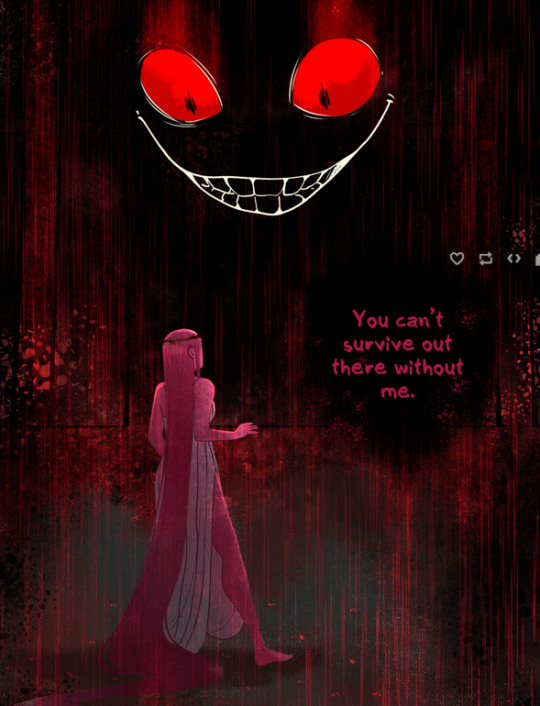
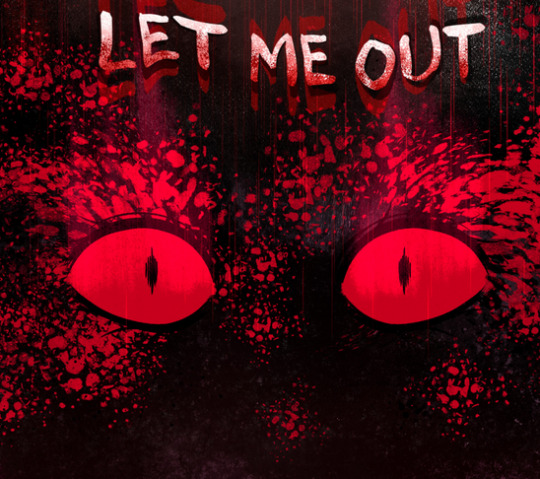
It's of persephone in a greenhouse her mother placed her in with this red eye thing following her from outside the greenhouse. I have no idea of this lurker if its her metaphorical rage or a danger in her life but either way, i am intrigued by its presentation.
The Characters
When reading lore rekindled and lore olympus, the characters are definetly an odd experience. For lore olympus, the characters arent exactly uh....great per say. I think the main reason for this is how their ultilised, with characters like eros, hera, hectate etc being there to mostly be a matchmaker for hades and persephone even if it was initially seen as wrong like with hera and hectate, be antagonistic as a way to have conflict between hades and persephone like minthe, demeter and recently leuce even if ones had reasons too like minthe with hades emotionally cheating on her and demeter because lets be honest, she had a point. Then there's hades and persephone, whoo boy where to start with them.
Hades starts off as a creep eyeing at persephone during a party, specifically at her body and still lusts persephone even being aware that shes 19 and he's 2000 years old. Also is a shitty boss, father AND contributes to slavery with it while being adressed in some way, doesnt change him which isnt good for a character that's meant to be the main protagonists love interest.
Persephone though, I can get the self insert vibes. From favouritism towards the story, being who most of the men in the story are attracted too, portrayed as a 'cinnamon roll' (they actually said that early on in the story, im not kidding) who cant do no wrong. She acts like a teenager rather than a young adult which makes the scenes where shes sexualised just more uncomfortable (and they already unnecessarily were) along with adding that uncomfortability to the romance
But with rekindled, they expanded on the characters much more than they originally were. Persephone for instance has turned from a 'sexy baby' legal teenager to an actual young relatable adult with agency and allows her to screw up (e.g, getting drunk on her own rather than eros drunking her). Her adult attitude makes the romance between her and hades not only more palpable, but also strays away from the infantilisation/uncomfortable sexualisation of her character which is nice to see. Hades also is written well in the series from how it acknowledges his faults while still making him likable. And thats the same for every character really, their personalities are much more fleshed out and nuanced which makes their characters feel real to life, gaining effectiveness for more emotional scenes with them. An interesting thing too is that they even expanded the magazine guy's character from making fake news for profit into feeling guilt over what they done, standing up for persephone which is a pretty nice change.
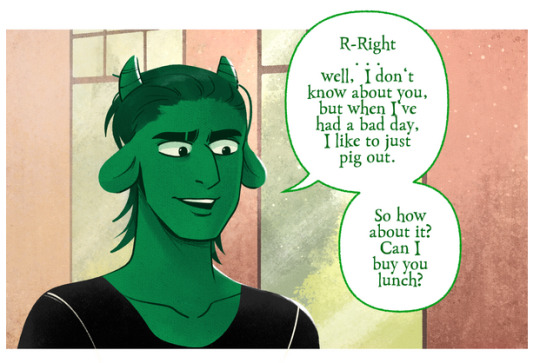
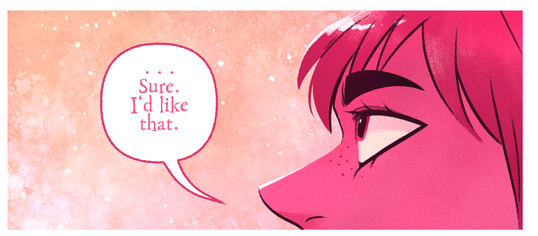
No Sa Plotline
Not like you cant have sa in your story ever but if you never planned it from the beginning and only did when people tell you that the scene you drew from your comic was sa then....maybe just not do it. Lore olympus does exactly that where while an attempt was made, it goes on to retcon it into making apollo (the guy who sa'd persephone) into a lesser evil like that would made a difference instead of just cutting it out from the very beginning. Lore rekindled thankfully just made apollo into his pilot version, a shitty bf but more likeable and expanded upon (which should have been his portrayal from day 1). His shittiness doesnt come up in the story, more like self absorbness/egotisticalness although with its recent chapter of the magazine guy offering persephone lunch, it might reveal some cracks or at least further down the story it will be revealed to us which futhers how effective rekindled character writing is in how its expansion of characters would give us the feels. That or portray him as not a good match for persephone, either way much better than the original.
Artstyle
Lore olympus has a pretty good artstyle (at least in s1/the early episodes, s3 is just kinda goofy) but lore rekindled has got a good artstyle which is on top, more consistent too. Here's some examples;
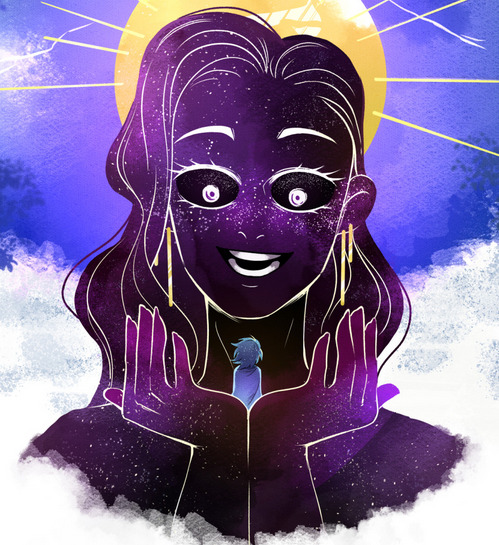
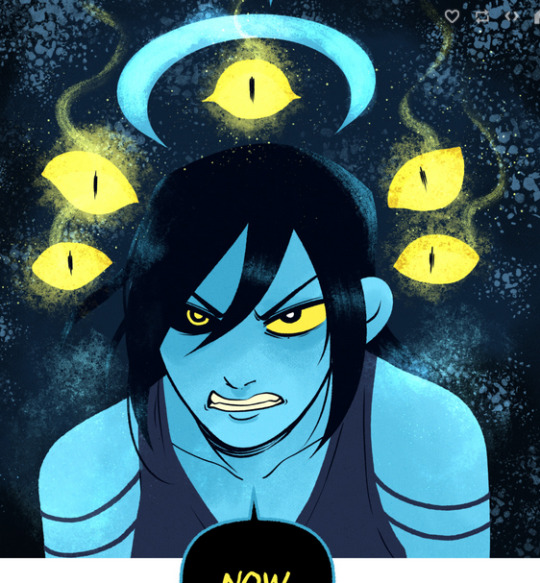

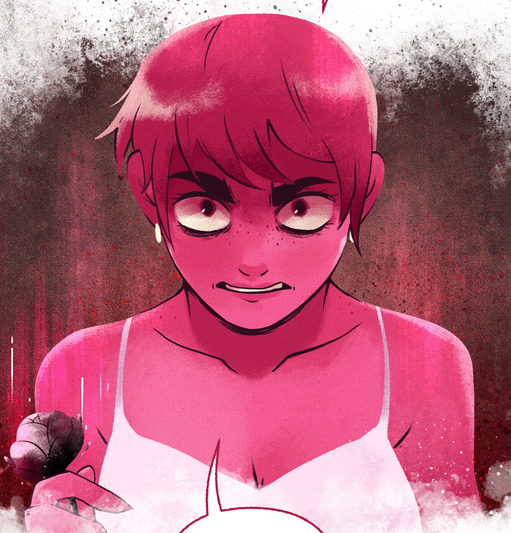
Comedy

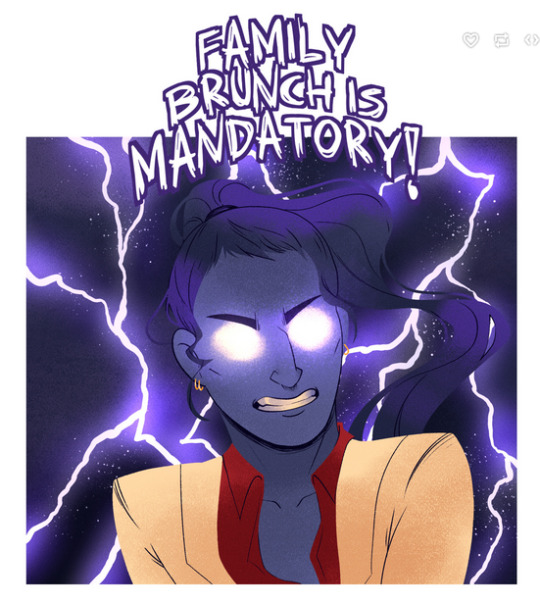


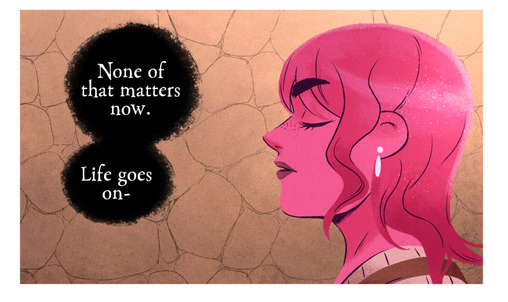

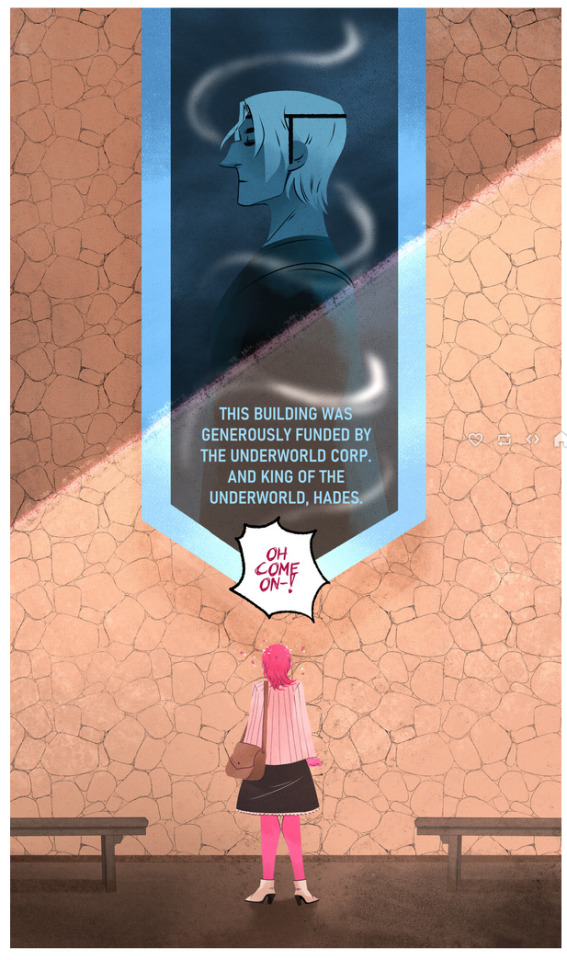
It's objectively funnier than lore olympus, no question asked
All in all, if you want to read lore olympus, i recommend you to read the lore rekindled one instead as it's better in every way. Give it a read.
#lore olympus critical#lo critical#anti lo#anti lore olympus#lore rekindled#generic puff#genericpuff
906 notes
·
View notes
Text
Fantasy Worldbuilding Without Ignorant Protagonists
A reminder, as we approach Arcane Season 2, that exposition in a fantasy setting can be given sparingly, and yet still tell an enthralling story.
Or, imagine how different Arcane, or Game of Thrones, or Lord of the Rings would have been if they were “stranger in a strange land” type fantasies with ignorant Earth protagonists who needed the whole plot and kitchen sink explained to them?
I dislike audience exposition vectors, not just in fantasy, but usually in a fantastical setting ranging from urban fantasy to superhero stories, because they’re an author crutch, giving the illusion of having to explain every little detail so the audience can keep up when… if this character wasn’t the hero, and you had to pick a character who knew about the world to be your protagonist, they wouldn’t be asking all these obvious questions and you'd still be able to tell the story.
I know why they exist, so they can be the vehicle through which the audience lives vicariously. We share their wonder and amazement as this cool new realm awes and humbles and frightens them.
But what these characters tend to lack is agency, specifically when they’ve been around in this setting for long enough that they really should start to know better. Or, if they’re built up as smart and self-sufficient, and yet don’t ever seek out information about the plot or their new world beyond asking the other characters dumb questions.
Example because I love these books: In The Titan’s Curse (PJO Book 3) Percy complains about not being able to manipulate the Mist, of which his new rival, Thalia, can do easily. This is one of the first things he does in the book. Because he has to remain the butt of the “seaweed brain” joke (and Annabeth must remain The Smart One), Percy hasn’t already learned how to do this very important trick (and he never does).
While it would behoove him to learn, when he’s had 2.5 years to do so, he just… didn’t. He also doesn’t know what the Manticore is to retain the suspense… when he’s had plenty of time and motive to study up on all the things that eagerly want to kill him, and has a nerdy girlfriend who’d be more than happy to lecture him with this information.
Even something as simple as Percy being shocked that he’s right that it’s the Manticore would have given him a little bit more agency. He’s an incredibly clever character, but still has to serve as the audience exposition vehicle, so he has to remain ignorant so the plot can explain things to him. He's as cherry-picked clueless as the story demands sometimes.
So. You want to have a character for the audience to live vicariously? Please give them expository agency.
Meaning–give them means and motives to learn about their new world on their own instead of asking questions as the plot demands. Or even let these characters form their own biases on what they think they know so that the actually knowledgeable characters can go “um actually”.
I once wrote a protagonist who was from her fantasy world, but purposefully ignorant about life beyond her planet. Why? So I could have all my other characters explain things to her that they would not explain to each other. But she was from a world with heavy information policing and manipulation, so she thought she knew plenty (naively, not arrogantly), giving plenty of fodder for conflict as opposed to just exposition.
It wasn’t just A learning about the new planet for the audience’s benefit, it was A realizing she was misled and lied to, and learning what “facts” she has that are wrong. Was it perfect? Heck no, but not only was this part of her character growth, by the second book, she was all studied up and when something unknown came along, the whole team shared in the confusion.
I did the same thing with Elias, my protagonist in Eternal Night of the Northern Sky. He’s very purposefully, literally sheltered, literally grew up under a rock, but his people have incredibly loud biases against vampires. Elias has plenty of knowledge about his world, both that is correct and vastly incorrect, while still lacking basic knowledge of other survival skills because he’s never had the opportunity.
Elias’s biases drive early conflict and conversation. He’s not going “what’s a vampire” so the other characters can stop the plot to explain them to him. He’s going “I know exactly what a vampire is” and the plot is him getting kicked on his ass with the truth.
So you can have that naive amazement factor, but also still have a character underneath. You can also let that character show off their acclimation into their world by not being afraid to stop making them the ignorant exposition machine.
Just thoughts.
#writing#writeblr#writing a book#writing resources#writing advice#writing tools#writing tips#character development#character design#fantasy#exposition#world building
71 notes
·
View notes
Text
So. What's the opposite of a sacrifice?
With the final episode looming it's a question we've been turning in our heads, so I wanted to give my best guess/analysis as to what it might be before Jon and Muna come to tear our hearts out in the final episode.
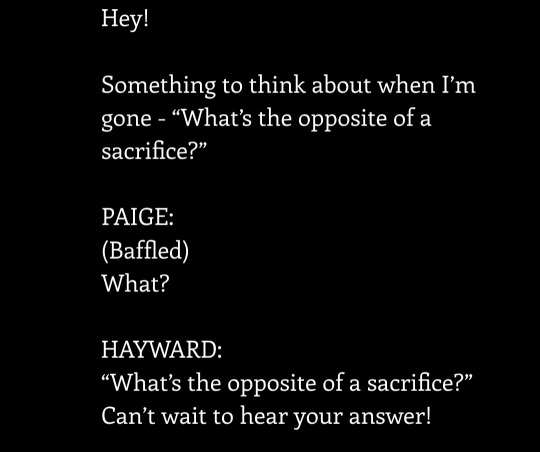
This is the question Hayward asks Paige, and later Carpenter, and it seems to be the underlying thematic statement of the series, in response to Carpenter's exposition in the first episode of the Silt Verses that introduces us to the fundamentals of the world and system they live in:
CARPENTER:
A god must feed.
A god must be fed.
This is a fact agreed upon across every territory in the Peninsula. And so, really, the only difference between the people born to the water and the people born to the land...
...is the precise nature of the sacrifice we need to make.
There is a God for anything in their world as long as there is someone believing in it. But all Gods need human sacrifices. A god must feed. A god must be fed.
These simple rules have been used as fascinating and horrifying metaphors of our modern society, and to explore themes of faith and sacrifice throughout the story.
And so the final question the last season proposes is if we can find a way to make something better, that can exist outside of this ultimately unsustainable exploitative system and the harm it inflicts upon ourselves and the world, when it has come to define so much of the way we live and how we think. And that means figuring out the opposite of a sacrifice, if they want to kill the idea, the lie, that is at the heart of their world.
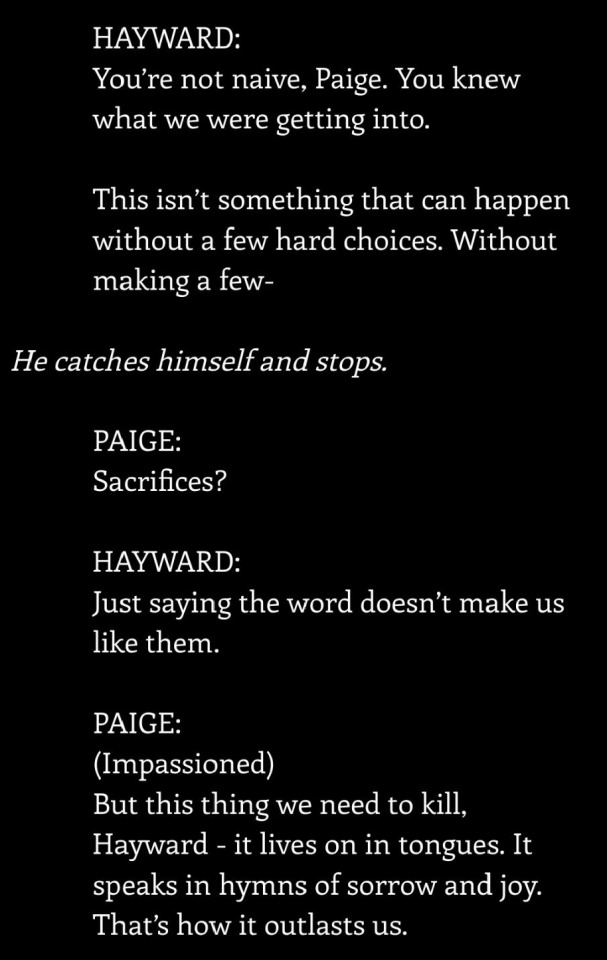
At first I thought the opposite of a sacrifice, of offering up to the gods, was about killing your gods. Starving them out. Refusing to offer up anything. And that is part of it, I think. I mean it's literally been a repeating mantra of multiple characters this season once they've reached they're breaking points. Violence in revolution as a tool to overthrow oppresive systems is sometimes needed and necessary. But what about after? What kind of future or vision for a better world can there be? There needs to be something at the heart of that movement that isn't just about violence against their opressors, because you then define yourself in relation to them.
This is even illustrated in the Many Below god Paige created having predator and prey emeshed together, a movement defined by their resistance against the predators of the world, the beasts, cannot seperate themselves to meaningfully create a better future that exists outside of that dichotomy. I think Hayward realises that even earlier in S2:
HAYWARD:
There’s a hare in the grass, half-buried and bloodied.
A barn owl has latched onto its back, its talons driving deep into the flesh of the hare.
Both animals are dead.
Familiar black stone veins protrude from the carcass of the victim, twisting like branches, driving upwards into the predator’s skin.
Hare and owl are locked together, inseparably.
The god must have struck just as the prey died.
White crocus is flowering up from the two entwined bodies.
(Unhappily)
And suddenly I begin to feel deeply afraid.
It all makes me think of a dormouse, dead in the dirt, its ribs showing. Of rabbits, teeth chattering, hungering from their cages
I kick dust up over the corpses. Nudge them aside into the long grass so they can’t be seen from the path.
Paige doesn’t need to know about this, I tell myself.
There’s no sense in worrying her. Not yet.
Which then makes sense why he's the one proposing the question of what the opposite of a sacrifice is to Paige (and Carpenter), for this very reason.
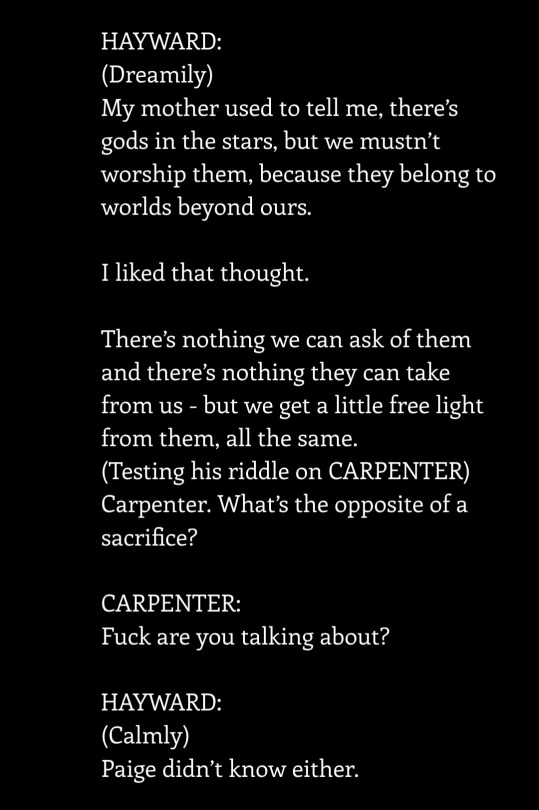
I think the answer is pretty simple and yet, like most simple truths in this world, it's forgotten and overlooked or twisted as naïve.
Preservation. The opposite of a sacrifice is preservation. To better explain this let me use an example:
If someone who cared about you tells you you're working too hard at your thankless job, sacrificing your sleep, your time, your personal relationships, your physical and mental wellbeing, far past the point considered sane, they'd tell you to stop. To make sure you take care of yourself. Instead of endlessly feeding yourself into a machine to justify your existence.
Applied to the world of the Silt Verses, it's not just self preservation and caring for yourself. It's about caring for, protecting, and preserving the lives of those around you, that is the ultimate act of rebellion and political warfare, the first steps forward towards a better world. Caring for humanity.
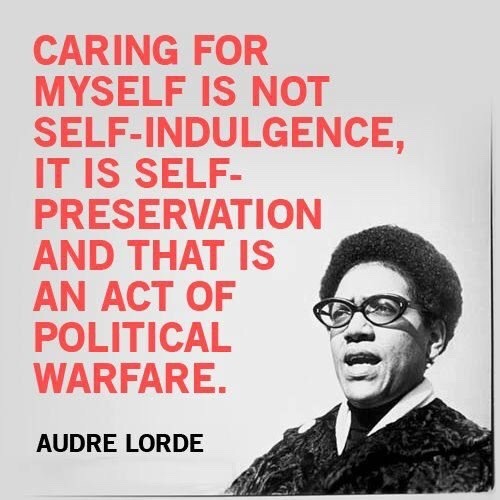
Whenever our characters reach a breaking point of turning against their gods, there's a common thread of wanting to save their fellow man, and realising the inadequacy of a god's ability to do that. Whether that's somebody close to them (like Faulkner and Paige):

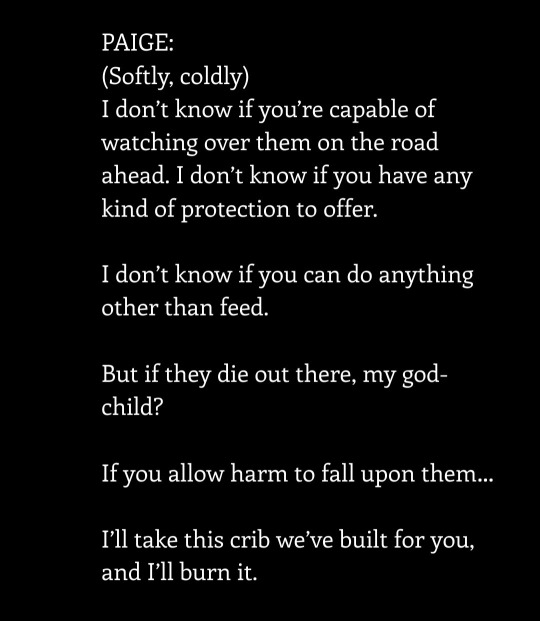
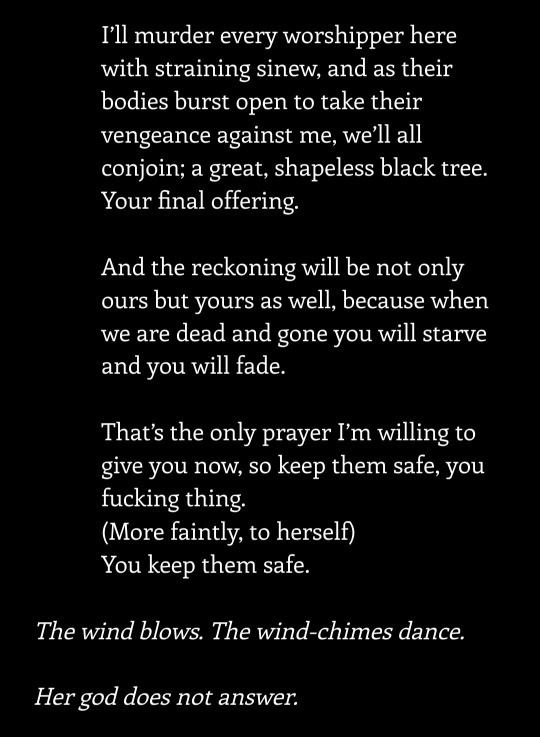
Or humanity as a whole (VAL and Shrue):
SHRUE:
Use them, pass them on, do not forget the suffering that keeps the engines of this world turning, forget the name of your god and cherish the name of your neighbour that was swallowed up by it-
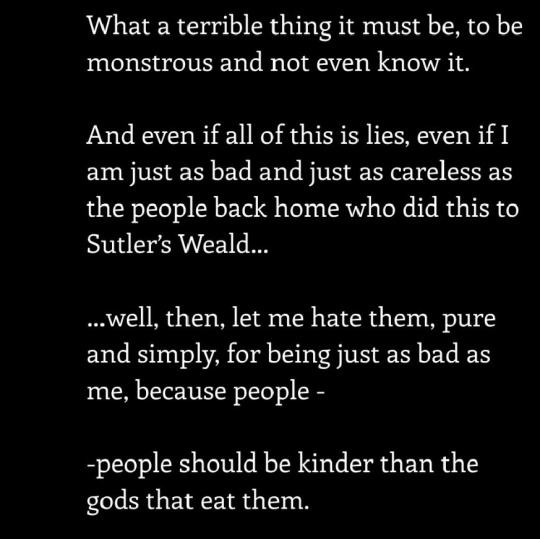
Cherish your neighbour. Be kinder to one another.
This can even go back to Carpenter's rejection of the Trawler-Man back in S1, her fury at the fact those she loved had been eaten (her family) and would continue to be eaten (Faulkner).
CARPENTER:
(Yelling to the river)
It's over between us, you twin mouthed prick!
Do you hear me?
Does that stir you from your torpor? Pry the barnacles loose from your sodden ears?
My father and mother were Gregory and Sandra Glass. My grandmother was Adalina Glass. My brother was Em.
They died for you.
Every single one of them died for you and they thought it meant something.
My name is Carpenter. And I am still alive!
I have loved you for so long. I have tried to know you for so, so much longer.
And I'm done with you. Here and now. I'm not laying down my life for you.
I'm not dying, do you hear?
The same breaking point for Faulkner at turning against his parish and finally snapping is the idea of Carpenter being offered as a sacrifice, an offering returned, begging for her to live.
I must clarify this is my own interpretation of the question and themes the story proposes. I'm
I'm not sure we'll actually get a hard answer so much as different characters offering their own answers and us as the audience encouraged to think for ourselves what it might be. I think this is what Hayward's answer might be at least, anyway, because like me he's a corny motherfucker:
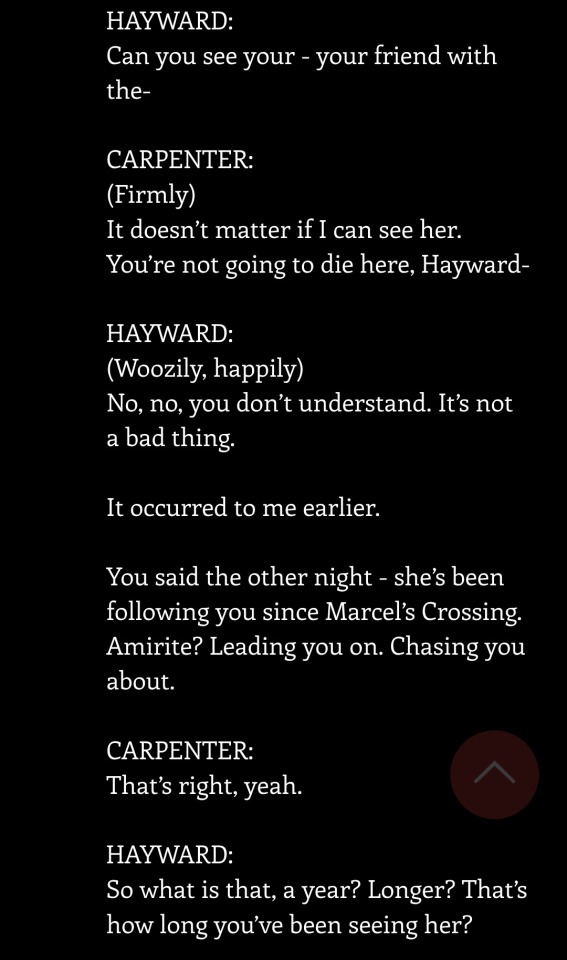
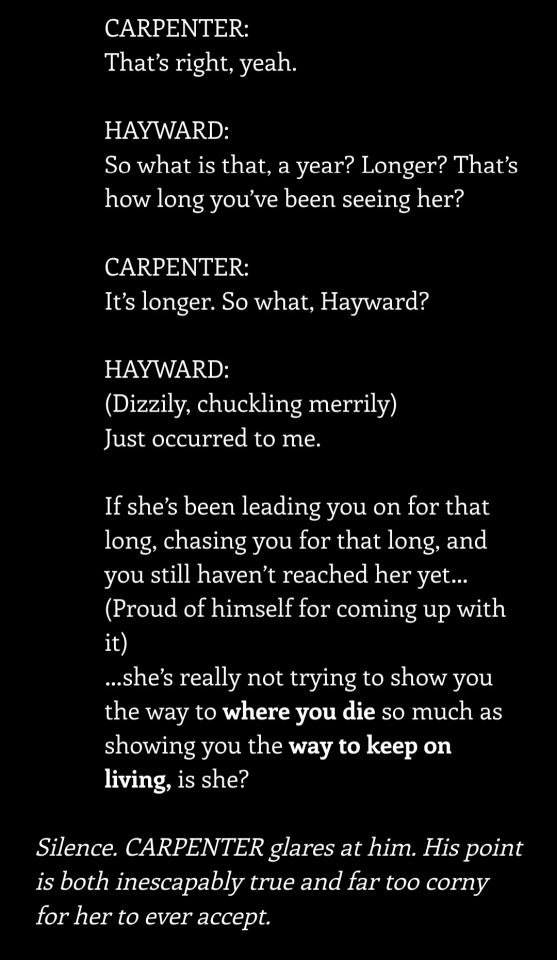
If a sacrifice is the idea that the most meaningful and transformative thing you can do is to give up your life, your sense of self, to die, then the opposite of that would be to try to keep on living, and finding meaning and transformation in that, surely?
#IT'S ABOUT FINDING A WAY TO KEEP ON LIVING#AND REACHING OUT TO HELP OTHERS DO THE SAME!#PRESERVATION!#CARING FOR EACH OTHER!#IN ALL THE COMPLICATED FUCK UPS AND MESS OF HUMANITY#AND ABSOLUTE ABSURDITY OF THE WORLD#THE SIMPLE TRUTH IS THAT OTHER PEOPLE ARE STILL ALL THERE IS!#the silt verses#tsv#tsv spoilers#tsv meta#tsv theories#not super satisfied with how I wrote thos but I also wanted to get it out before the finale comes to beat me up#sister carpenter#brother faulkner#paige duplass#adjudicator shrue#val the silt verses#it'll be bittersweet and tragic but I still believe they'll be hope at the end#however small#james hayward
126 notes
·
View notes
Note
I’m curious as to your honest thoughts on the show? Like I love pjo and all but the show was a bit of a let down writing wise. There’s always the point of “it’s an adaptation, not a carbon copy” like yes but this new writing isn’t exemplary better than the book just because it’s rewritten by the author himself
I think the show is well-written not because Rick is attached to it, but because I actually like the way the writers are approaching adapting the source material. I have a lot of issues with the original books in terms of writing quality because frankly speaking, I don’t think Rick is a very good writer. He has a lot of interesting things in those books that he never explores or drops within the first two and this fandom gives him and the books too much credit imo.
This is why I’m not very moved when people try to ascribe meaning to a certain scene or choice he made in the books to get mad at the show for changing. As an example, one of the main things people were upset about was the kids “knowing everything” in the show when they were getting tricked left and right in the book. Many posts were dedicated to how the book version is superior because it illustrates how they’re just twelve years old kids so of course they’ll make mistakes and get tricked by monsters.
That’s a perfectly fine interpretation but I was twelve years old when I first read tlt and I was able to anticipate almost every single trap, despite being pretty gullible and naive at that age. My knowledge of Greek mythology consisted of Disney’s Hercules, maybe two Google searches, and my second grade teacher’s reading of the kid friendly version of the Odyssey. No where near the level of Percy who’d been learning for a whole year in an established class on the topic with Chiron or Grover who was literally a satry born into the world or Annabeth, who spent the majority of her life dedicated to studying specifically quests and Greek mythology and was also on the run fighting monsters for a good portion of her childhood. Like twelve year olds can be dumb but those three stumbling into every trap was asking me to suspend my disbelief too far. I remember being upset that they weren’t able to figure it out because it was obvious that Rick wasn’t making that choice to show any personality flaws or character dynamics (because he would’ve had them learn and grow but they never did they just kept being not smart), he just wasn’t able to figure out a way for them to fall into those traps organically so he had to dumb them down.
I think the show was able to get across the characters’ childishness without compromising their established backstories. Yes, Annabeth knew it was Medusa right away because that makes sense for a kid who has experience with running into monsters. But, she still acted very much like a child in her interactions with her (and throughout the episode and season). She lashed out and called her a liar and wouldn’t listen to her side of the story because it painted her mother in a bad light. That’s peak twelve year old behavior.
Yes, Percy figured out Kronos was behind everything, but it makes sense because Percy knows Greek mythology and where Kronos resides. He still very much acts like a child when he asks Hades to give him back his mom in exchange for nothing because it’s the right thing to do.
There are dozens of examples like this for a lot of complaints of the show. And this is not me saying that the show is perfect: every single show has flaws. For me, I wasn’t the biggest fan of the dialogue or the exposition dumping. It didn’t hinder my enjoyment though because I don’t think it was egregious (and wrt the exposition dumping, I expected it because the book did it and there’s really no way to “show not tell” Greek myths). I also didn’t like that we didn’t get to really see the huge clashes between Zeus and Poseidon in the weather (we got references to it through news reports but I would’ve liked something more). I was able to look past it because I really liked the storytelling and the themes the show was pulling out of the original source material.
I loved Medusa-Sally parallels and Medusa-Annabeth parallels. I loved the juxtaposition of Pan’s quest to manifest density. I loved Percy and Annabeth’s opposite trajectory in respect to their relationships with their godly parents. I loved exploring Sally’s choice to send Percy to school instead of camp. I loved explicitly coding Annabeth as autistic. I loved Luke’s backstory being brought earlier into the story. I loved the deadline passing and Poseidon surrendering to save Percy. I loved Persues-Andromeda and percabeth parallels. I loved fleshing Grover out. I loved glory vs home seeking being the central theme of the show.
And lastly, I was able to understand that with a limited number of episodes and run time (due to the nature of child labor laws!), they did the best they could and I feel like they did a pretty good job for a first season.
These are not ALL of my thoughts on the show because that would be a very long post. I gave one detailed example of why I think the show succeeded in something the fandom tries to ascribe the books and it was like three paragraphs lol. Anyway this is not the post to try and convince me that the show is bad for whatever reason you have cooked up. I’m not going to change my mind and I doubt I’ll change yours. Here’s to a season 2 that builds on a solid season 1!
#pjo#percy jackon and the olympians#percy jackson and the olympians#percy jackson#pjotv#pjo tv show#pjo tv series#pjo adaptation#pjo disney+#pjo season 1#pjo season 2#annabeth chase#grover underwood#sally jackson#poseidon#luke castellan#the lightening thief#walker scobell#leah sava jeffries#aryan simhadri#virginia kull#toby stephens#charlie bushnell#rick riordan#rr crit#rick riordan critical#my asks
64 notes
·
View notes
Text
I think one of the best elements of fantasy world-building for making a setting feel unique is its magic system. There's a lot of ways to approach building a magic system, and most of those ways can produce something compelling, but an approach that I've been thinking a lot about recently is what I call the Three Questions approach, because I think a lot of the times generic and interesting magic systems show up in stories that aren't really about the magic and so don't want to spend very much narrative space or exposition wordcount on it. Three Questions is great because it creates something unique and interesting without consuming much page space, and can also help with the rest of your world-building if you feel like spending a little more than the bare minimum on it.
The Three Questions are:
Where does magic come from?
What can it do?
What can't it do?
Answering the questions in order is helpful because the answer to each question suggests the answer to the next. The best recent example I've read of this system comes from How To Become the Dark Lord and Die Trying, and I'm gonna walk through that book's magic system in this context to illustrate why this approach is so effective.
Where does magic come from?
A mineral called thaumite, which grows in the body of monsters.
What can it do?
Thaumite comes in different colors, each of which corresponds to a different type of magical effects. Humans can use thaumite as a material component to create spells with effects determined by the color and magnitude determined by the size of the thaumite. Non-humans can instead consume thaumite and gain permanent passive benefits of a type thematically related to the color of thaumite. For example, red thaumite can cast fire spells and increases physical strength. Non-humans also need thaumite to live and thrive, though they can go without eating it a lot longer than they can go without food and water. Non-humans can theoretically live forever if they keep finding thaumite, but they need it more and more often as they age.
What can't it do?
Humans can't eat thaumite and be enhanced by it, and non-humans can't cast intentional spells. You can't cast spells that aren't thematically linked to an existing type of thaumite, so big complicated idiosyncratic curses and the like are off the table.
The book lays out all of this scattered through the first quarter of the book without any big egregious blocks of exposition dumping, and the results are really cool. We now know exactly what kinds of tools and challenges are protagonist can use, what limitations they have to work around and exploit, and as a result, engaging with the magic system feels like it has understandable stakes. The mechanics of the magic system inform the rest of the world-building as well - humans and non-humans are in constant conflict over access to thaumite, and the human kingdom is more built up technologically because they can utilize deliberate spells to accomplish things on a scale that non-humans can't. It all makes the world feel real and distinct.
This obviously isn't the only way to make a good magic system, and there are some things that you might want out of a magic system - like mystery and uncertainty - that this system can't accomplish by itself. But I would love to see this used more often in, say, romance stories in fantasy settings to make the world feel like less of an afterthought. Good world-building leads to better and more memorable storytelling, even when what you think you want is specific trappings to enable your story and nothing else.
84 notes
·
View notes